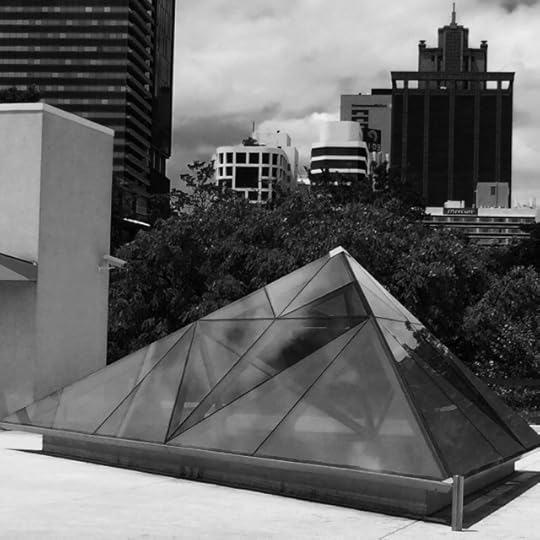Simon Groth's Blog, page 2
May 26, 2016
What we see in the mirror
Upon seizing office in September last year, the latest person to join the Australian Prime Ministerial conga line said these words: "there has never been a more exciting time to be an Australian". I can only assume they were said sincerely.
At the time, I was hard at work remixing short stories originally written by Marcus Clarke and what became clear to me from this reading was how exciting it must have been to be an Australian in the 1870s. Clarke captured a nation in emergence, full of wide-eyed optimism and youthful vigour: a collection of colonies and a nascent culture that yearned not just for nationhood, but for greatness. But it was also a culture that carried dark stains and its aspirations in the near century and a half since have been offset and gnawed at by an instinctive and unthinking pettiness.
I had also, perhaps not coincidentally, developed an obsession with an extraordinary song called Definitive History by Augie March, where lyricist Glenn Richards deals directly with these same ideas. It's an angry song, no question, but its aesthetic is more of an anger that has burned out, an exhausted shell of despair.
In the final story from Hunted Down I imagine a scenario in which Clarke berates me for having the temerity to modify his excellent work. The story gave me the opportunity to try and capture what the most exciting time to be an Australian feels like from the inside.
With the words of Clarke and Richards swirling in my head, this is what I came up with.
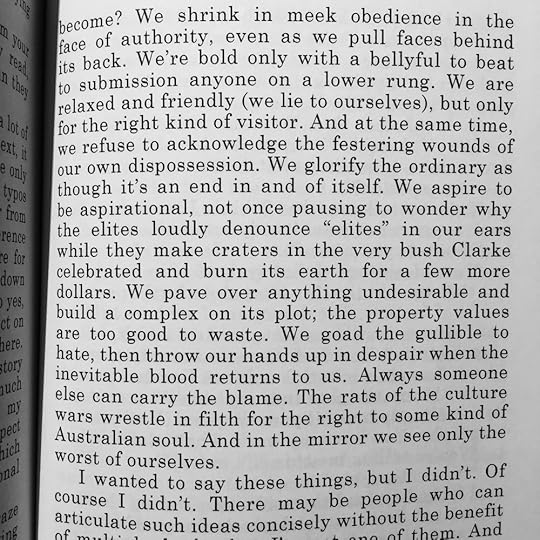
To quote:
I wanted to think I might have touched a nerve, shared the sadness and mourning for a nation that has lost its innocence, but learned too little in the process. This is what had been gnawing at me ... What did Clarke observe about who we were and what does it say about who we’ve become?
We shrink in meek obedience in the face of authority, even as we pull faces behind its back. We’re bold only with a bellyful to beat to submission anyone on a lower rung. We are relaxed and friendly (we lie to ourselves), but only for the right kind of visitor. And at the same time, we refuse to acknowledge the festering wounds of our own dispossession. We glorify the ordinary as though it’s an end in and of itself. We aspire to be aspirational, not once pausing to wonder why the elites loudly denounce “elites” in our ears while they make craters in the very bush Clarke celebrated and burn its earth for a few more dollars. We pave over anything undesirable and build a complex on its plot; the property values are too good to waste. We goad the gullible to hate, then throw our hands up in despair when the inevitable blood returns to us. Always someone else can carry the blame. The rats of the culture wars wrestle in filth for the right to some kind of Australian soul. And in the mirror we see only the worst of ourselves.
Hunted Down is available now for the small price of one shilling (currency and inflation adjusted).
May 25, 2016
May 8, 2016
Is copyright fit for purpose?
I was recently invited to contribute a position paper for CREATe, which is the RCUK Centre for Copyright and New Business Models in the Creative Economy, based at the University of Glasgow. The topic was:
Is The Current Copyright Framework Fit For Purpose?
And was subtitled 'Insight from the publishing industry and beyond'. I probably represent the beyond. So I was asked to investigate the current copyright framework and whether it is actually doing what it purports to do for writing, reading, and publishing in the digital age?
It's a topic on which I have written previously, so some of it may be familiar.
The proliferation of digital media has presented enormous challenges to writers and other creative professionals in an environment where downloading, copying, and streaming digital files can take precedence over the purchase or borrowing of physical artefacts.
My own perspective on copyright is informed primarily by my experiences as someone whose writing has appeared in print since 2000 and on the web since 1995. But it is also informed by my experience with if:book Australia, commissioning, publishing, and distributing creative work from others in a non-commercial environment.
Regardless of how it was initially conceived and for whom it was initially intended to benefit, modern copyright has evolved into a mechanism whose intention is to allow creators to benefit from original works by granting them control over it for a period of time. It means that creators of an original work can expect fair compensation and acknowledgement when their work is bought and sold, adapted, referenced, and so on.
April 22, 2016
Infinite Blue to be published in North America
I have been holding off making a big deal about this, but I guess if an announcement is being made, I should probably share it around too. The link is behind a paywall but the headline is all you need to know.
Orca acquires YA novel by Darren and Simon GrothDarren and I first worked together on Concentrate many years ago now and this is a story we've had kicking around for a while. The thought that it would see its first publication in Canada is a bit surreal.
April 19, 2016
Hunted Down and Other Tales
This week, if:book began sending out the first highly bespoke copies of a new work of literary remix called Hunted Down and Other Tales by Marcus Clarke . Yeah, that's the full title.
It's part of a larger project called Rumours of My Death. I don't usually step in as author on creative if:book projects, but this one one was unusual in being even more vague and open ended from the outset than usual.
My job with this book was to select an Australian author whose work is in the public domain and bring their work into the 21st century. The only rule was around the medium. Previous #RoMD projects had taken place on the web and social media. This one had to use print.
I worked as author/remixer with editor Aimée Lindorff and designer George Saad and collectively, this is what we came up with.
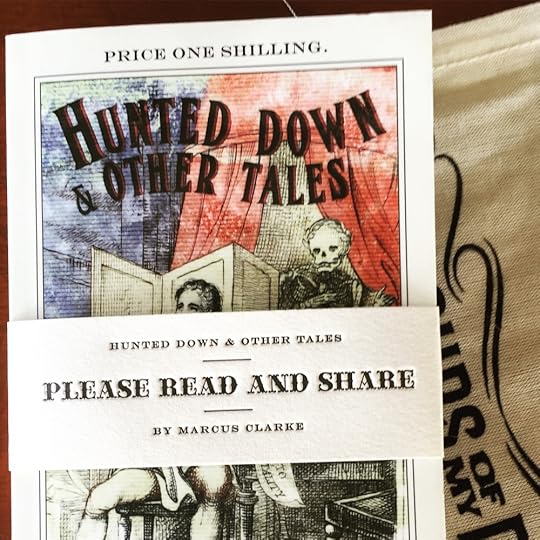
Hunted Down and Other Tales by Marcus Clarke
Although everything in the book has come from a digital source, it uses a variety of printing techniques from digital print on demand to letterpress to hand screen printing.
The book itself is based on the little short story anthologies Marcus Clarke published in the 1870s. Designer George Saad created a note-perfect reproduction, something that became clear when we compared Hunted Down side by side with a copy of Holiday Peak and Other Tales from 1873.
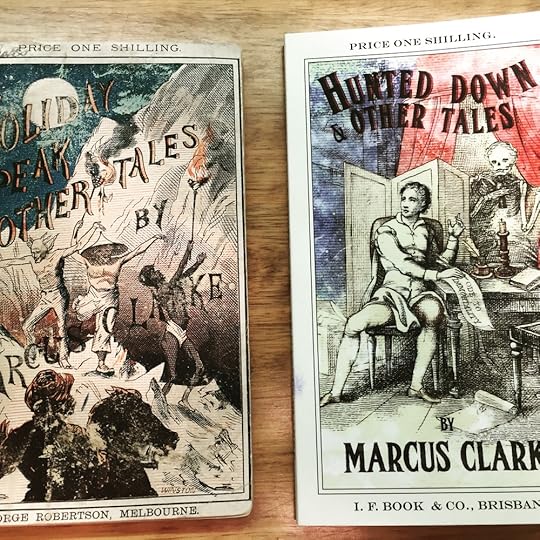
Holiday Peak from 1873 alongside Hunted Down from 2016. Some things never change.
There's so much more to write about this, some of which I'll post over at if:book, some of which will be here.
March 16, 2016
#RoMD
I've been teasing this upcoming work everywhere except here, so here's the correction to that oversight. Just as a work exploring print technologies it's been fun. So far it has involved digital print on demand, traditional letterpress, and silk screen printing by hand, all from digital sources.

March 11, 2016
Interview for We the Humanities
A great interview this week with Matt Finch, current Creative in Residence at the State Library of Queensland, Australia on if:book, Brisbane, my background and even a bit on my academic work.
I’m looking at how digital tools can be (and are being) used to change the relationship between writers and readers. In particular, I’ve been fascinated by the technical innovation of experimental writers from around the 1960s. These writers took radical steps such as removing the binding of books in order to give the reader greater control over the narrative.
February 16, 2016
Analogue notes for a digital story
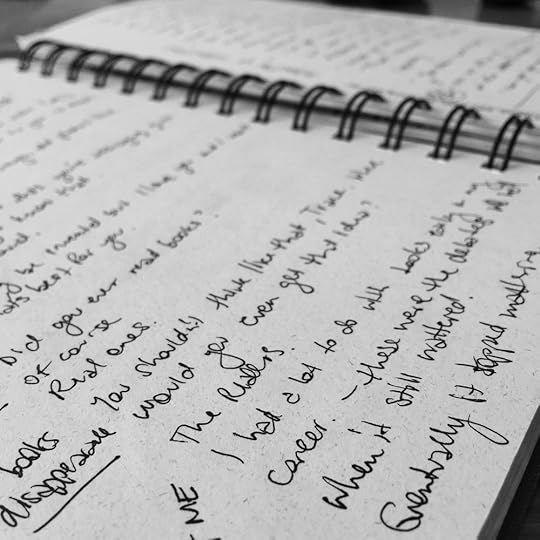
The story I'm working on right now is highly dependent on digital tools (and probably overly complex), but planning and plotting still happens in a decidedly lo-fi fashion.
January 26, 2016
December 20, 2015
Obit.: Microsoft Word 2008 (2008 - 2015)
Today I farewell a friend, a singular (sort of) witness to countless hours of my work over a keyboard over many years.
Actually, ‘friend’ is pushing it a bit. Let me start again.
Today I farewell one my essential tools of trade—vale, Microsoft Word 2008:
You survived seven years’ worth of hardware and software upgrades (an eternity in technology). And only now I lose you, just when things had been going so well and I had begrudgingly accepted your quirks and customised your most obscure settings and templates, and in the course of my work ceased to really notice you much at all.
A writer’s choice of word processor is very individual and a certain degree of fussiness (some might say “fartiness”) is surely to be expected. Some writers like to move around between different kinds of software. Some demand no formatting or scoff at the folly of fake pages. Others just fall into habits. And while experimenting with writing techniques and technology is part of my brief, for the straight up job of getting text out of my head my go-to software was one of the most feature-bloated and clunky bits of kit Microsoft had seen fit to bestow upon us since Clippy first observed that it looked like I was writing a letter.
Two years ago, I experimented with writing on a typewriter and discovered how profoundly the tools with which we write affect how we go about what we do. At the time I said:
I’m a cut-and-paste writer. This sentence has been cut-and-pasted at least half a dozen times in the creation of this essay. My approach to writing is to throw sentences down, and use a little C & P magic to fashion them into something with flow and form.
Cut and paste, find and replace, dictionary and thesaurus, header and footer, line and paragraph formatting, and the keyboard shortcuts to all these are a feature set to which I’ve grown extremely accustomed and without which I find it difficult to get rolling.
I never loved Word 2008, but I never hated it either and, when I needed to produce text, it did the job. At least until recently.
For the record, I do like to keep my software up to date. And there’s good reason for this. The most common software updates patch annoying bugs and fix security holes that would otherwise threaten your system and your data.
But once in a while, software companies like to shake things up. They get bored with the features and layout and set about radically redesigning it. Sometimes these redesigns are for the better. Sometimes a redesign needlessly screws around with the interface. When the new version of your word processor takes a flawed but organised toolkit and turns it into an interminable forest of tabs and obscure unlabelled buttons, you can either take it on the chin and upgrade anyway or stick to your guns.
It’s fine to say ‘if it ain’t broke, don’t fix it’ for a while at least, but all software has a hard use-by date. Even the software companies that stay in business can’t support all their products indefinitely. It’s hard to imagine Redmond continuing to publish regular security updates for Microsoft Bob (look it up).
Really—unless you’re willing to encase your computer in amber, resolve never upgrade anything again and never connect it to a network—at some point, the software simply will stop working with its operating system.
So it was with Word 2008. It always had a fickle, skittery streak to it, but my recent OS upgrade sent it into a tailspin. It crashed when I try to save. It crashed when I did a word search. It crashed while starting up. Sick of losing work in progress, I took to obsessively hitting ‘save’: an old, old habit dredged up from when I stored master copies of my documents on floppy disks.
There’s a paradox in this need to constantly save: when your writing flows freely and you become immersed in your story, pausing to save your work is (and should be) the last thing on your mind. So the crash that takes your work with it (to some unrecoverable digital hell) is almost guaranteed to happen when you feel like you’re doing your best work.
For a while I tried to find a balance between saving and writing. I swore (a lot). I shook my fist, even. But then I would reopen the application, tell it not to send diagnostic information (what good would it do?) and try and get back to where I was, all the while saving, saving, saving.
It couldn’t last. The bond of trust between writer and software had irrevocably broken. It was always going to end this way, but I had hoped to get maybe just a little more time from it.
I have now begun the difficult process of finding a replacement and although nothing feels quite right, there’s no turning back. So, Word 2008, for the moment, while you remain in my applications folder for now, soon I will have to let go completely and send you to the big crash.
Thank you for your tolerable familiarity.


